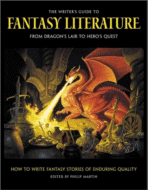Fantasy and A Christian Worldview
One of the reasons I love to write fantasy is because of the good vs. evil conflict present in the stories. In most fantasy types—classic or high fantasy, adventure fantasy, even fairy-tale fantasy—good and evil are defined in rather stark, unyielding terms, based on what the author believes.
 Philip Martin, editor of The Writer’s Guide to Fantasy Literature writes:
Philip Martin, editor of The Writer’s Guide to Fantasy Literature writes:
Fantasy, then, is speculative fiction that takes one giant step inward. It is highly imaginative, wondrous fiction, rooted in inner beliefs and values. Fantasy is about good and bad, right and wrong.
Martin makes a case for fantasy differing from science fiction because it is not tied to the rational.
Fantasy celebrates the nonrational. Wrapped in a cloak of magic, it dares a rational reader to object to a frog suddenly being turned into a prince. Where an explanation would be required in science fiction, fantasy says: “Because it did.” Though fantasy may offer some cause and effect—the prince probably did something wrong in the first place to cause him to be turned into a warty amphibian—no scientific rationale is required.
There is a reason, says science fiction. We believe says fantasy.
Surprisingly, this definition offers a couple of stumbling blocks to evangelical Christians in accepting fantasy as valuable. First is this contrast between belief and reason. Frankly, that bothers me, too, because I find my belief to be eminently reasonable. Faith is not faith based on nothing.
But true faith does admit that there are things in the world that are beyond a person’s ability to explain completely. Fantasy does nothing more than capitalize on this fact.
A reader of fantasy, then, enters a world constructed by an author’s beliefs. If the author is a student of God’s Word and relies on that source to inform his beliefs, then his world, his fantasy story, will be filled with truth. The kind of truth that can’t otherwise be explained.
Fantasy’s first value, therefore, is that it can give voice to a Christian’s deepest held beliefs.
Re-posted from A Christian Worldview of Fiction, May 13, 2006






























And yet, it seems that part of the objection that some Christians have to fantasy literature is that it is a “lie”. For this reason, they also object to science fiction or any other fiction. Rational or irrational, a lie is a lie, they claim.
They base this belief on the scriptures that our “yes should be yes and our no, no”, and “do not bear false witness”.
How does a bible-believing Christian writer of fantasy fiction reconcile this?
Esther, way back in 2007, on the old Speculative Faith site, I took a crack at that one:
Still that’s just a basic overview — if I wrote more about it, I’d probably capitalize on the truth that Jesus’ parables were “lies” (as were His comparisons of the Kingdom to a man buying a field, etc.). The Psalms’ artistic excellent would come into play too.
But I’m also sure Rebecca’s written more about the whole “fiction is lies” objection. …
Esther, Stephen’s answer is very good. I’d simply add that I don’t believe a statement or story can be considered a lie if there is no intention to deceive. If I say, What I’m about to tell you did not happen, can what I then say be considered a lie?
Essentially when an author writes a novel he is saying, This story didn’t actually take place.
That may bring up another question, however. Why intentionally write something that is not true. Wait a bit. Something that is an imagined story that did not happen can still convey truth. Stephen’s example of Christ’s parables illustrate this point clearly.
In other words, the “made up” can be revealers of what’s real, what’s true. In essence, this is why I write fantasy. I think people can see truth in an imagined world with make-believe characters. Their struggle points to our struggle.
Thanks for the thoughtful question.
Becky